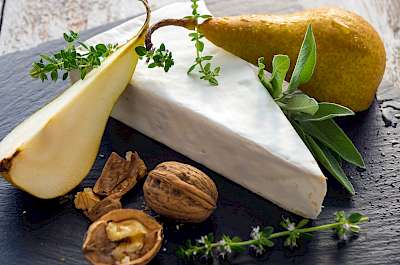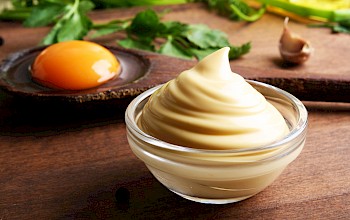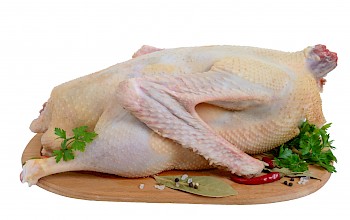Brie: Calories and Nutrition Analyse
How many calories in Brie?

Nutrition Facts
BrieServing size:
slice of Brie (23 g) change
5g10g15g20g30g40g50g60g80g100g120g140g160g180g200g220g250g300g350g400g450g500g600g700g800g900g1000g
1oz2oz3oz4oz5oz6oz7oz8oz10oz12oz15oz20oz25oz30oz35oz40oz50oz
Amount Per Serving:
100g of Brie contain about 334 calories (kcal).
Calories per:
ounce
| slice
| small cylinder
| medium cylinder
| large cylinder
For instance, a slice of Brie (23 g) contain about 77 calories.
This is about 4% of the daily caloric intake for an average adult with medium weight and activity level (assuming a 2000 kcal daily intake).
Scroll down for details and nutrition tables.
To visualize how much 77 kcal actually is, keep in mind that the calorie content of one slice of Brie is similar to that of, for example:
- 1 apple
- 0.5 glass of Coca Cola (220 ml glass)
- 0.5 slice of cheese
- 0.5 slice of bread
- 0.5 glass of milk
- 4 cubes of sugar
Take a quick look at the tables below for detailed information about Brie nutrition.
100g of Brie
Nutrition
- Calories334
- Carbs Total0.45 g
- Dietary fiber0 g
- Fat27.68 g
- Protein20.75 g
- Water48.42 g
Vitamins
- Vit A592 IU
- Vit B1 (Thiamine)0.07 mg
- Vit B2 (riboflavin)0.52 mg
- Vit B3 (Niacin)0.38 mg
- Vit B60.235 mg
- Vit B9 (Folic acid)0.065 mcg
- Vit E0.24 mg
- Vit K0.002 mg
Minerals
- Potassium152 mg
- Phosphorus2.3 mg
- Magnessium20 mg
- Calcium184 mg
- Sodium629 mg
- Iron0.5 mg
- Zink2.3 mg
Discover the Nutritional Value of Brie Cheese: A Guide to Its Health Benefits
When it comes to cheese, Brie is a standout favorite for many. Known for its creamy texture and mild, earthy flavor, Brie is not just a culinary delight but also a fascinating subject in the world of nutrition. Whether you're a cheese aficionado or someone mindful of their diet, understanding the Brie calories, Brie nutrition, and its role in a healthy diet can be quite enlightening.
Interesting Facts About Brie
Brie, often referred to as the "Queen of Cheeses," has a rich history dating back to the 8th century in France. Its creamy interior beneath a rind of white mold is the result of careful aging processes. But beyond its royal taste and texture, Brie's nutritional profile is equally impressive.
Nutritional Breakdown of Brie
- Calories: 334 per 100 grams
- Protein in Brie: 20.75 grams, making it a good source of high-quality protein
- Fat in Brie: 27.68 grams, with a focus on saturated fats
- Carbs in Brie: A minimal 0.45 grams, with no fiber but a small amount of sugar (0.45 grams)
- Water content: 48.42%, which helps contribute to its soft texture
The Role of Brie in a Healthy Diet
Despite its rich flavor, Brie is surprisingly moderate in calories, making it a suitable option for those monitoring their intake. The protein in Brie is noteworthy for muscle repair and growth, while the fat in Brie, though high, consists mostly of saturated fats. It's important to consume these fats in moderation as part of a balanced diet.
The carbs in Brie are virtually nonexistent, which makes it an excellent choice for low-carb and ketogenic diets. However, its high sodium content (629 mg per 100 grams) suggests that those with sodium-sensitive conditions should enjoy Brie in moderation.
Additional Nutritional Benefits
Brie is not just about fat, protein, and carbs. It's also rich in essential vitamins and minerals, including:
- Vitamin A (592 IU): Important for vision and immune function
- Vitamin B2 (0.52 mg): Aids in energy production and cell function
- Calcium (184 mg): Essential for bone health and muscle function
- Zinc (2.3 mg): Supports immune health and wound healing
With its complex nutritional profile, Brie can be a valuable addition to a balanced diet, offering benefits beyond its delightful taste.
Conclusion
Whether enjoyed on a cheese platter, melted in a sandwich, or as a sophisticated topping, Brie's unique qualities extend beyond the palate. Understanding the Brie calories, Brie nutrition, protein in Brie, fat in Brie, and carbs in Brie reveals how this beloved cheese can fit into a healthy, balanced diet. So, the next time you indulge in the creamy goodness of Brie, you'll appreciate not just its taste but also its contribution to your nutritional well-being.
How many calories are there in 1, 2, 3, or 5 servings of Brie?
- Slice of Brie (23g)77 kcal
- Brie small cylinder (125g)418 kcal
- Brie medium cylinder (300g)1002 kcal
- Brie large cylinder (500g)1670 kcal
- Ounce (oz) of Brie95 kcal
- Half of medium size servings of Brie38.5 kcal
- Small size serving of Brie (18g)61.6 kcal
- Big size Brie (30g)100.1 kcal
- Two medium size servings of Brie154 kcal
- Three medium size servings of Brie231 kcal
- Four medium size servings of Brie308 kcal
- Five medium size servings of Brie385 kcal

Similar calories number have:
See also:
Read this:
- How many calories does spanakopita have?
- Calories in a half of chobani yogurt nonfat
- Calories in whole chobani yogurt nonfat
- Calories for one, two or more chobani yogurt nonfat
- Calories in tablespoon of chobani yogurt nonfat
- Calories in teaspoon of chobani yogurt nonfat
- How many carbs (carbohydrates) in crayfish?
- How much fat in Butterfinger?
- How much protein in crab salad?
- What is weight of chef salad?
- Clam chowder calories per ounce (oz)
- Empanada calories per serving size



Add comment